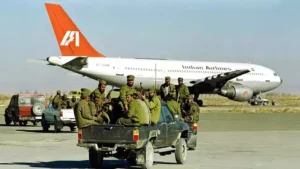Russian President Vladimir Putin has announced that he is open to negotiations to end the war in Ukraine but stated that talks would not be possible with Ukrainian President Volodymyr Zelenskyy. His remarks come as the war nears its third year, with heavy casualties and no diplomatic breakthrough in sight.
Putin’s statement raises questions about who he would be willing to negotiate with in Ukraine, as Zelenskyy remains the country’s elected leader. Many analysts see this move as an attempt to delegitimize the Ukrainian government and pressure Kyiv into accepting Russian conditions for peace.
Zelenskyy Responds: “Putin Is Afraid”
In response, Ukrainian President Volodymyr Zelenskyy strongly rejected Putin’s stance, accusing him of using “cynical tricks” to delay meaningful peace talks. Zelenskyy said that Putin is afraid of direct negotiations because he does not want to take responsibility for the war Russia started.
“Putin does not want real peace—he wants to control Ukraine on his terms,” Zelenskyy said in a recent speech. “This is not about diplomacy; it is about trying to weaken Ukraine and divide our allies.”
Putin Says Talks with Ukraine Possible, Russia’s Possible Motives
Many political analysts believe that Putin’s refusal to engage with Zelenskyy is part of a broader strategy to undermine Ukraine’s leadership. By refusing to recognize Zelenskyy as a negotiation partner, Russia may be trying to:
- Destabilize Ukraine’s political system: By signaling that he will only negotiate with different leadership, Putin could be encouraging political divisions within Ukraine.
- Buy time for military gains: Delaying talks allows Russian forces to consolidate their positions and push for territorial advances.
- Pressure Western allies: By making negotiations conditional on Zelenskyy’s absence, Putin may be testing the patience of Ukraine’s Western supporters, hoping to weaken their resolve.
Challenges in Negotiating Peace
1. Lack of Trust Between Russia and Ukraine
Ukraine and its allies have repeatedly said that Russia cannot be trusted to honor peace agreements. Previous deals, such as the Minsk Agreements, failed after Russia continued its aggressive policies in eastern Ukraine.
2. Ukraine’s Demand for Full Sovereignty
Ukraine has been clear that any peace deal must include the full withdrawal of Russian troops from occupied territories, including Crimea. Russia, on the other hand, has shown no willingness to abandon its claims over these regions.
3. Western Support for Ukraine
The U.S., NATO, and European nations have strongly backed Zelenskyy’s leadership and rejected any notion of bypassing him in negotiations. The West sees any attempt to exclude Zelenskyy as an attack on Ukraine’s sovereignty.
What This Means for the Ongoing War
Potential for Peace Talks
While Putin’s statement suggests openness to dialogue, refusing to negotiate with Zelenskyy makes a peace deal unlikely. Ukraine has stated that only its elected leadership can negotiate on behalf of the country, meaning that excluding Zelenskyy is not a viable option.
Continued Conflict Likely
As long as Russia insists on negotiating under its own terms, the war is likely to continue. Ukraine, with strong Western support, is unlikely to accept a deal that undermines its independence. Meanwhile, Russia appears willing to prolong the conflict, hoping that international support for Ukraine will weaken over time. Putin Says Talks with Ukraine Possible
Putin’s refusal to negotiate with Zelenskyy is a significant barrier to peace. While both sides claim they are open to talks, their conditions make finding common ground difficult. With ongoing military clashes and no diplomatic solution in sight, the war is set to continue, affecting millions of lives in Ukraine and beyond. The international community will play a key role in determining whether diplomatic pressure can eventually bring both sides to the negotiating table.




















